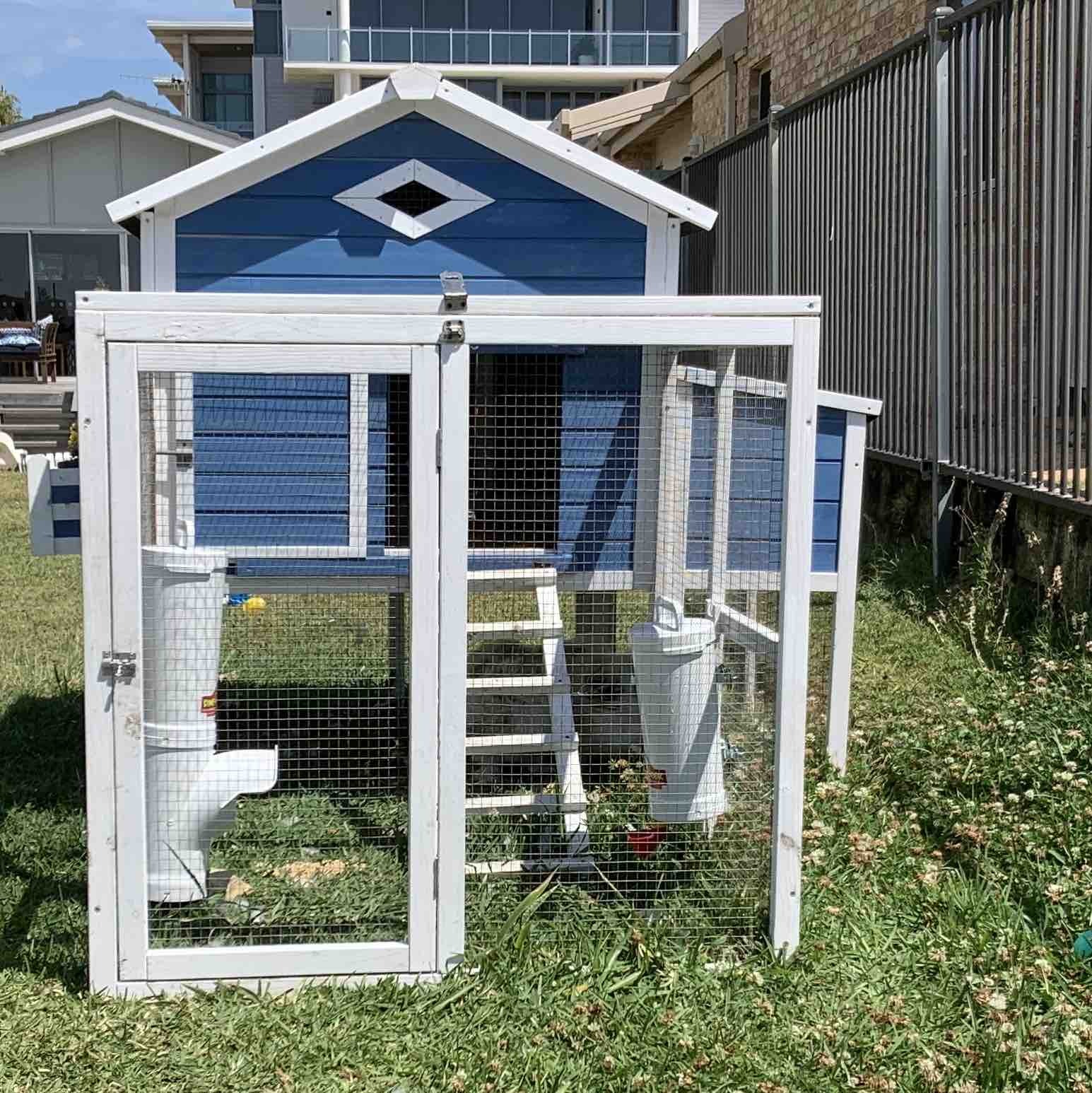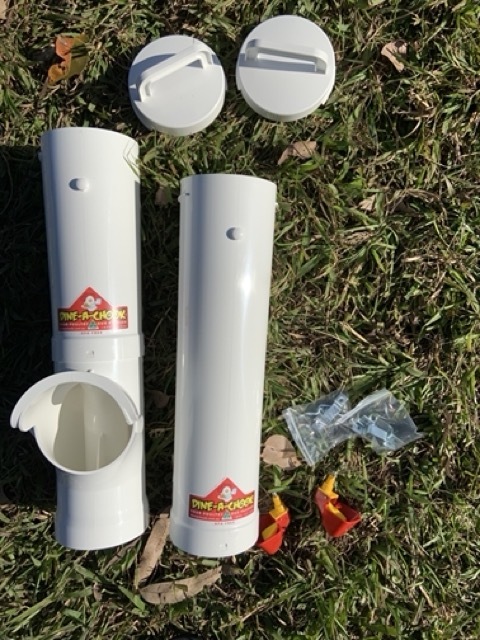Top 5 Things You Need to Get Started with Keeping Chickens
Getting Starting with Chickens: The Top 5 Things You Need
Keeping chickens is one of the most rewarding things you can do. There's something magical about gathering fresh eggs and watching your flock forage peacefully. But to make the most of your chicken-keeping journey, it’s important to start with the right essentials. Starting out well can be difference between smooth sailing and a bumpy ride.
Whether you're dreaming of colourful eggs or just a closer connection to the natural world, here are the five must-haves every flock needs for stress-free chicken keeping.
Key Takeaways
- A safe, predator-proof chicken coop is essential for healthy, happy hens.
- Choose a high-quality chicken feed and a feeder that reduces waste and keeps food clean.
- Always provide fresh, clean water with a reliable poultry waterer.
- Select comfortable, absorbent bedding to maintain a healthy coop environment.
- Start with a small, beginner-friendly flock.

1. A Safe, Comfortable Chicken Coop
The heart of your chicken keeping setup is the coop. Your chickens need a comfortable coop to roost at night, lay their eggs, and shelter from bad weather.
Chickens are also vulnerable to predators, such as foxes, dogs, snakes and goannas. There is nothing more traumatic than losing your flock to a predator attack, so a safe, secure coop is essential.
When choosing or building a chicken coop, make sure it has:
- Enough space: At least 1 metre squared per chicken inside the coop, more if they’re not let out
- Good ventilation to prevent respiratory issues
- <Protection from the weather, particularly strong wind and rain
- Nesting boxes for egg-laying: One box per 3-5 hens, positioned in a quiet area of the coop
- Roosts for sleeping off the ground: Roosts should be at least 5 cm in diameter and no more than 1 m from the ground - learn more about the perfect roost here
- Strong protection from predators: Coop materials need to prevent strong animals, like dogs, breaking in, and smaller predators, like snakes, getting in any gaps; coops also need to be locked at night.
Pro Tips:
Position your coop on well-drained, higher ground if possible, and provide shade to prevent overheating in hot weather.
If you don’t fancy opening the coop each morning and locking it at night, invest in an automatic coop door.
Build a coop that is easy to clean, you’ll thank yourself later! Provide good access and decent ceiling heights.
Chicken math is real – build a coop that will accommodate more chickens than you plan to keep. Flocks have a habit of expanding!
2. Quality Feed and a Reliable Feeder
A healthy diet is key to happy, productive chickens.
The best diet for chickens is:
- A complete, high-quality layer feed: This will provide all of the nutrients that hens need to thrive and lay plenty of nutritious eggs
- No more than 10 % scraps: While it’s nice to see kitchen scraps turned into fresh eggs, a diet high in scraps will reduce egg production and lead to health issues. Feed scraps in the afternoon and no more than hens will eat in 20 minutes. Avoid processed foods and stick to fruit and vegetables.
- Supplemented with free-choice shell grit: Grit is essential for digestion and shell grit provides laying hens with much-needed calcium. Always provide grit free-choice and chickens will take what they need.
- Never fed on the ground: Feed and scraps that are fed on the ground are contaminated with dirt and droppings, spreading disease. Always use clean dishes and choose a Feeder that protects feed from contamination. We might be biased, but we recommend a Dine-A-Chook Feeder!
Pro Tips:
Choose a pellet or crumble feed to prevent selective feeding, which causes waste and nutritional deficiencies.
There is nothing more frustrating than spilled, wasted feed. It is expensive and attracts rodents and pest birds. Choosing a waste-reducing Dine a Chook Chicken Feeder will prevent waste and reduce rodents, as well as keeping feed fresh and dry.
A couple of Feeders positioned around the coop will ensure that lower-ranked hens can eat their fill.
3. A Clean Water Supply
Chickens can't thrive without constant access to clean, fresh water. In fact, even a few hours without water can impact their health and egg production.
Choose a chicken waterer that:
- Is enclosed: It is important to keep water clean and free from contamination
- Has nipple or cup outlets: Nipples and cups prevent spills, helping to keep the coop dry. They are also a healthier option, preventing contamination and the spread of disease.
Shop Dine-A-Chook Nipple and Cup Drinkers
Pro Tips:
Check your waterer daily and clean it regularly.
Chickens prefer cool water, so place your waterer in a shady position.

4. The Right Bedding Material
The right bedding keeps your coop clean and comfortable. It also reduces disease and odours by keeping the coop dry.
Choose a bedding that is absorbent and easy to spot-clean. Some popular options include:
- Straw or hay: This is the most popular option but isn’t very absorbent or easy to spot clean.
- Wood shavings: Choose dust-free wood shavings intended for animal bedding, as other options can irritate chickens’ respiratory tract.
- Hemp bedding: Highly absorbent and eco-friendly.
- Sand: Can be heavy and damp, but is very easy to clean if it is kept dry.
Pro Tips:
A droppings board under the roosts will collect poop overnight. While it needs daily cleaning, it keeps the coop much cleaner overall.
Regular spot-cleaning can reduce the frequency of deep cleans.
While deep-litter systems sound great, they are very hard to manage effectively. If the bedding isn’t actively composting, deep litter is dirty and spreads disease.
5. Chickens
Of course, you can’t keep chickens without the chickens themselves!
When choosing your first chickens:
- Start with a small flock: Around 3-6 birds is perfect for beginners. It’s enough for a steady egg supply and flock companionship, but not overwhelming.
- Look for breeds known for being friendly and hardy, like Australorps, Orpingtons, or Sussex. While ISA Browns and other commercial layers are widely available and usually highly productive, they tend to be less resilient than heritage breeds.
- If you are getting chickens for the first time, consider getting hens first and adding a rooster later, as roosters can require more management.
- Think carefully before starting out with chicks, as they require much more attention and specialised care than older birds.
Pro Tips:
Think carefully before starting out with chicks - they require a lot more attention and care than older birds. Point-of-lay and adult hens are also more economical than chicks, although they cost more, because they will start laying eggs straight away.
Look for hens from a reputable breeder or hatchery, as they are less likely to carry diseases or have other issues.
Conclusions
Raising chickens is an adventure full of small joys — from their funny antics to the first time you find a warm egg in the nest. With the right setup, you’ll be well on your way to enjoying all of the benefits of backyard chicken keeping without the stress!
Do you want to learn more about starting out with chickens? Check out these other blog articles:
- The Beginners Guide to Chicken Keeping - All your FAQs, answered by experts!
- What Do Chickens Want? How to keep your flock happy and healthy
- Don't make rookie errors: 10 Common Chicken Keeping Mistakes to Avoid
- The Best Diet for Laying Hens
- Where to Buy Chickens
Happy chicken keeping!
Rachael at Dine-A-Chook Australia



